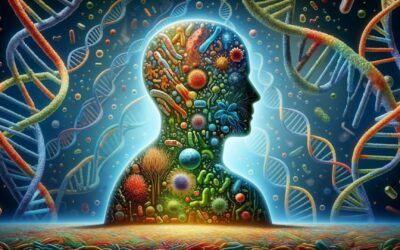- Introduction
- The Illusion of Perception: Exploring the Relationship Between Reality and Our Senses
- Plus Discussion Questions
- Q — What is the relationship between perception and reality? Can we ever truly perceive reality as it is?
- Q — How do illusions and cognitive biases affect our perception of the world? How can we overcome these limitations?
- Q — How does scientific inquiry help us gain a more accurate understanding of the world? What are some of the limitations of science in this regard?
- Q — How does direct experience inform our understanding of the world? What are some of the limitations of relying solely on direct experience?
- Q — What role does critical thinking play in developing a more accurate understanding of the world? How can we cultivate critical thinking skills?
Introduction
Is what we perceive a true reflection of reality? This article explores the relationship between perception and reality, and how scientific inquiry, direct experience, and critical thinking can help us gain a more accurate understanding of the world. Learn about the limitations of our senses, the role of confirmation bias, and the importance of seeking multiple perspectives.
The Illusion of Perception: Exploring the Relationship Between Reality and Our Senses
Have you ever wondered if the world you see and experience is the same as the world that really exists? Do we perceive the world as it really is, or are our perceptions merely illusions? This is a question that has fascinated philosophers, scientists, and people in general for centuries. In this post, we will explore some of the theories and evidence related to this topic.
The first thing we need to understand is that our perception of the world is not a direct representation of the world itself. Rather, our brains construct a representation of the world based on the sensory information that we receive. This sensory information includes things like light, sound, touch, taste, and smell. Our brains then interpret this information and construct a model of the world that we experience.
One of the most famous examples of how our perception can differ from reality is the Müller-Lyer illusion. This is a visual illusion in which two lines of the same length appear to be of different lengths due to the addition of arrowheads pointing in opposite directions. Even though we know that the lines are the same length, our brains still perceive one line as being longer than the other. This demonstrates that our perception can be fooled by visual cues and that what we see is not always an accurate representation of reality.
Another example of how our perception can differ from reality is the phenomenon of change blindness. This is the tendency for people to miss changes in their visual environment when those changes occur gradually or during a brief interruption. For example, if you were asked to watch a video of people passing a basketball back and forth and asked to count the number of passes, you might completely miss a person dressed in a gorilla suit walking through the scene. This demonstrates that our brains can be so focused on one task that we can miss important details in our environment.
So, if our perception is not always accurate, how can we know anything about the world around us? One way that we can gain knowledge about the world is through scientific inquiry. Science is a systematic process of observing, measuring, and testing hypotheses about the world. By using instruments that extend our senses and by developing methods for controlling and manipulating the environment, scientists are able to gather data that can help us understand the world more accurately.
For example, consider the field of astronomy. We cannot directly observe stars and planets with our eyes alone, but through the use of telescopes and other instruments, astronomers are able to gather data about the positions, motions, and properties of celestial bodies. This data allows them to develop theories and models that explain the behavior of these objects and the structure of the universe.
Another way that we can gain knowledge about the world is through direct experience. We can touch, taste, smell, and hear things directly and use these experiences to inform our understanding of the world. However, even direct experience can be misleading at times. For example, the taste of a food can be influenced by its appearance, texture, and even the expectations of the person eating it. So, while direct experience can be valuable, it is not always a reliable guide to the truth.
Despite the limitations of our perception, there are some things that we can be reasonably certain about. For example, we can be reasonably certain that the world is composed of physical objects that obey the laws of physics. We can also be reasonably certain that our experiences are caused by external stimuli rather than being purely mental constructs.
One reason we can be reasonably certain about these things is that they are supported by multiple lines of evidence. The laws of physics have been confirmed through countless experiments and observations, and our experiences of the world are consistent with the behavior of physical objects. Additionally, the fact that different people can have similar experiences of the world suggests that our perceptions are not entirely subjective.
However, even with the weight of evidence on our side, there are still limitations to what we can know about the world. For example, there are many things that we cannot directly observe, such as the inner workings of the human brain or the nature of dark matter. In these cases, we have to rely on indirect evidence and inference to build our understanding of the world.
Moreover, there are limitations to the instruments that we use to observe the world. For example, telescopes are limited by the quality of the optics and the amount of light that they can gather, and microscopes are limited by the resolution of the lenses and the physical properties of the samples being observed. These limitations mean that our observations of the world are never entirely comprehensive or definitive.
Another challenge to our perception of the world comes from the fact that our brains are not passive receivers of information. Rather, our brains actively construct our perceptions based on our expectations, beliefs, and prior experiences. This can lead to a phenomenon known as confirmation bias, in which we selectively attend to and remember information that confirms our existing beliefs and ignore or discount information that contradicts them. Confirmation bias can lead us to see patterns or connections that are not actually there, or to interpret ambiguous information in a way that supports our preconceptions.
For example, if we have a preconceived notion that people from a certain group are more likely to be dishonest, we might interpret ambiguous behaviors by members of that group as evidence of their dishonesty, while ignoring or downplaying similar behaviors by members of other groups.
So, how can we overcome the limitations of our perception and gain a more accurate understanding of the world? One way is to be aware of the limitations of our perception and to actively seek out and consider evidence that contradicts our preconceptions. This can help us to avoid confirmation bias and to develop a more nuanced and accurate understanding of the world.
Another way is to seek out multiple perspectives and sources of information. By exposing ourselves to different points of view and interpretations, we can broaden our understanding of the world and avoid getting stuck in narrow, limited views of reality.
Additionally, we can use critical thinking skills to evaluate the evidence that we encounter and to identify flaws or biases in our own reasoning. Critical thinking involves questioning assumptions, examining evidence, considering alternative explanations, and evaluating the strength of arguments. By using critical thinking, we can develop a more rigorous and accurate understanding of the world.
In conclusion, while our perception of the world is not a direct representation of reality, it is still possible to gain an accurate understanding of the world through scientific inquiry, direct experience, and critical thinking. However, we must be aware of the limitations of our perception and actively work to overcome biases and preconceptions in order to develop a more accurate and nuanced understanding of the world. By doing so, we can expand our knowledge and appreciation of the complexity and beauty of the world around us.
Plus Discussion Questions
Q — What is the relationship between perception and reality? Can we ever truly perceive reality as it is?
The relationship between perception and reality is complex. Our perception of the world is not a direct representation of reality, but rather a construction of our brains based on sensory information. Our perception can be influenced by factors such as illusions, cognitive biases, and prior experiences. Therefore, it is unlikely that we can ever truly perceive reality as it is, since our perception is always a subjective interpretation of the sensory information available to us. However, through scientific inquiry, direct experience, and critical thinking, we can gain a more accurate understanding of the world and its underlying properties and laws. While we may never have access to an objective reality, we can still develop a nuanced and accurate understanding of the world that can inform our actions and decisions.
Q — How do illusions and cognitive biases affect our perception of the world? How can we overcome these limitations?
Illusions and cognitive biases can affect our perception of the world by causing us to misinterpret or misrepresent sensory information. Illusions are examples of perceptual distortions, where our brains incorrectly process sensory input and create a false perception. Cognitive biases, on the other hand, are systematic errors in thinking and decision-making that can affect our perception of reality. These biases can arise from a variety of factors, such as prior experiences, beliefs, and social and cultural influences.
To overcome these limitations, we can take several steps. One approach is to increase our awareness of the limitations of our perception and the potential biases that may affect our thinking. By being conscious of these factors, we can actively work to identify and correct for them. For example, if we are aware of the Müller-Lyer illusion, we can consciously remind ourselves that the lines are the same length and try to override our initial perception of a size difference.
Another approach is to seek out multiple perspectives and sources of information. By exposing ourselves to different viewpoints and interpretations, we can broaden our understanding of the world and avoid getting stuck in narrow, limited views of reality. This can help to mitigate the effects of cognitive biases, as we are less likely to be swayed by a single viewpoint or interpretation.
Additionally, we can use critical thinking skills to evaluate the evidence that we encounter and to identify flaws or biases in our own reasoning. Critical thinking involves questioning assumptions, examining evidence, considering alternative explanations, and evaluating the strength of arguments. By using critical thinking, we can develop a more rigorous and accurate understanding of the world, and avoid being misled by illusions and biases.
Overall, while illusions and cognitive biases can affect our perception of the world, we can take steps to overcome these limitations by increasing our awareness, seeking out multiple perspectives, and using critical thinking skills.
Q — How does scientific inquiry help us gain a more accurate understanding of the world? What are some of the limitations of science in this regard?
Scientific inquiry helps us gain a more accurate understanding of the world by providing a systematic and rigorous way of observing, measuring, and testing hypotheses about the world. Through the use of instruments that extend our senses and by developing methods for controlling and manipulating the environment, scientists are able to gather data that can help us understand the world more accurately. By analyzing and interpreting this data, scientists can develop theories and models that explain the behavior of natural phenomena and the underlying laws of the universe.
One of the strengths of scientific inquiry is that it is based on empirical evidence, which is gathered through observation and experimentation. This means that scientific theories and models are subject to rigorous testing and scrutiny, which helps to ensure that they are based on accurate and reliable information. Additionally, scientific inquiry is open to revision and modification, as new evidence is gathered and new theories are developed.
However, there are also limitations to what science can tell us about the world. For example, there are some phenomena that are difficult or impossible to observe directly, such as the inner workings of the human brain or the nature of dark matter. In these cases, scientists must rely on indirect evidence and inference to build their understanding of the world, which can be subject to interpretation and uncertainty.
Additionally, scientific inquiry is limited by the instruments and methods that we use to observe and measure the world. Instruments such as telescopes and microscopes are subject to physical limitations, such as resolution and sensitivity, which can impact the accuracy and comprehensiveness of our observations. Furthermore, the methods that we use to manipulate and control the environment can also introduce limitations and biases into our observations and measurements.
Despite these limitations, scientific inquiry remains one of the most powerful tools that we have for gaining a more accurate understanding of the world. By continually refining and improving our methods and instruments, we can expand the scope and accuracy of our observations and measurements, and develop increasingly accurate models and theories of the world.
Q — How does direct experience inform our understanding of the world? What are some of the limitations of relying solely on direct experience?
Direct experience is an important way that we gain knowledge about the world. By using our senses to directly interact with the environment, we can learn about the physical properties of objects, the qualities of different materials, the taste and smell of foods, and many other aspects of the world around us. Direct experience can also help us to develop a more nuanced and personal understanding of the world, as we build up a collection of memories and associations that shape our perceptions and behaviors.
However, there are limitations to relying solely on direct experience to understand the world. For one, direct experience can be highly subjective and variable, depending on factors such as mood, attention, and expectations. For example, the taste of a food can be influenced by factors such as its appearance, texture, and the social context in which it is consumed. Similarly, our perceptions of colors can be influenced by cultural and linguistic factors, which can lead to variations in color perception across different societies.
Additionally, direct experience is often limited by the scope of our individual lives and experiences. While we may have direct experience of certain aspects of the world, such as our local environment or our personal relationships, we may lack direct experience of other aspects, such as the experiences of people from different cultures or the workings of complex systems such as the global economy or the natural environment.
Overall, while direct experience is an important way that we gain knowledge about the world, it is limited by the subjective and variable nature of our perceptions and the scope of our individual experiences. To gain a more comprehensive and accurate understanding of the world, we must also rely on other sources of knowledge, such as scientific inquiry and critical thinking.
Q — What role does critical thinking play in developing a more accurate understanding of the world? How can we cultivate critical thinking skills?
Critical thinking plays a crucial role in developing a more accurate understanding of the world by helping us to evaluate evidence, question assumptions, and identify flaws or biases in our own reasoning. Critical thinking involves actively examining and analyzing information, considering alternative explanations, and evaluating the strength of arguments. By using critical thinking skills, we can develop a more rigorous and accurate understanding of the world.
There are several ways that we can cultivate critical thinking skills. One approach is to actively seek out diverse perspectives and sources of information. By exposing ourselves to different viewpoints and interpretations, we can develop a more nuanced and comprehensive understanding of the world, and avoid getting stuck in narrow, limited views of reality.
Another approach is to actively question assumptions and examine evidence. This means being open to alternative explanations and actively seeking out evidence that contradicts our existing beliefs or assumptions. By doing so, we can identify flaws or biases in our own reasoning and develop a more accurate understanding of the world.
Additionally, we can use tools and techniques to help us evaluate the quality of information and arguments. This might include using logical reasoning, evaluating the credibility of sources, and assessing the strength of evidence. By using these tools and techniques, we can develop a more critical and discerning approach to information and avoid being misled by false or misleading claims.
Overall, critical thinking is a powerful tool for developing a more accurate understanding of the world. By actively questioning assumptions, evaluating evidence, and seeking out diverse perspectives, we can develop a more nuanced and comprehensive understanding of the world around us.












0 Comments